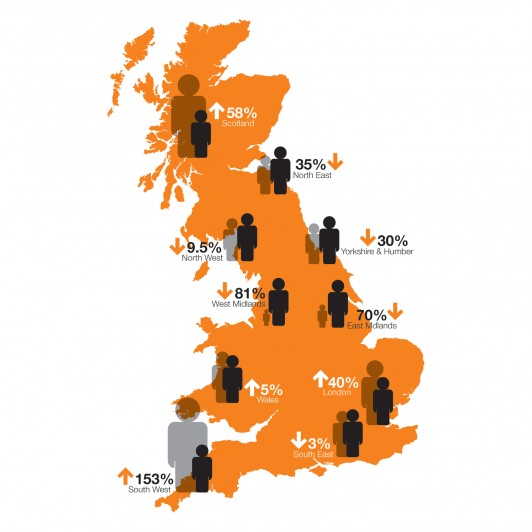Cornwall could be in line to become the UK’s new Silicon Valley as a report from Orange suggests that the drive towards universal broadband could result in city-based workers heading to the South West for a better life.
The South West as a whole could see a population increase of more than 150% by 2015 as access to faster internet speeds allows more people the flexibility to live and work in a place of their choosing. This would present exciting opportunities for Cornish businesses and property owners alike as demand for services and properties increase.
The ‘Connected Britain’ report, conducted by YouGov, found that workers would accept pay cuts of almost £7,000 a year for a chance to work from home, choosing more idyllic surroundings, should the necessary technology be available.

Orange UK, Director of Corporate Marketing, Robert Ainger said,
“The long-entrenched domination of the South East in Britain’s economic structure could at last be coming to a close, with many workers wanting to trade their city lives to work from more rural and idyllic parts of the country. Much like the industrial revolution, the digital revolution we are currently going through will forever change the way we all lead our lives.”
“Universal connectivity is already having a huge impact on our lives,” said Futurologist James Bellini.
“Our research shows that already 39% of people are able to work some or all of the time from a location of their choice and employees are increasingly realising that they can be just as productive working from home or on the move. As connectivity across Britain increases, so too will mobile working, making the traditional office almost obsolete. In fact, by 2020, a successful and forward-looking business will have no HQ, probably no CEO and only a fraction of the fixed assets it has today.” he continued.










This study draws some very misleading conclusions… Silicon Valley is so-named because it is a centre of technology business and entrepreneurial start-ups. This is absolutely not the same thing as people having fast broadband and working from home.
Second, the SW cannot conceivably have population increase of 150% by 2015. This would mean its population would be multiplied by 2.5, going from 5,000,000 to 12,500,000 in six years. This rate of migration would be unprecedented in British history, and has no possible drivers for such change in jobs, economy, birthrate, housing etc. Instead, collapsing house prices have actually *decreased* the number of people leaving London and; the SE for more rural locations, as they find they have insufficient equity in their homes to buy the rural retreat they wanted.
Finally, the percentage of people working entirely from home as actually fallen since 2002.
Who is this “futurologist”, and why is this report so ungrounded in reality?
Hi Jay,
Thanks for your comments.
The story is based on a press release from Orange UK, following a study conducted on their behalf by YouGov. (See http://newsroom.orange.co.uk/search/Connected%20Britain)
Contained within their ‘Editors Notes’ of the press release was this additional information:
——————————-
The survey of 3,281 UK office workers also reveals the potential impact that a more connected Britain might have on the geographical spread of the UK’s working population. Although 40% of office workers are happy in their current work location, according to the study, 39% would rather live and work by the seaside, the countryside or the mountains.
Overall, the responses show a desire to move away from the UK’s traditional industrial and economic hubs such as the North East and the Midlands to more rural, idyllic locations, such as Devon. The South West, currently the fifth most populous region in the UK, would be by far the most popular region in which to live, with London coming in at second place+. This would have far-reaching implications for both businesses and the UK’s service requirements or even transport networks.
The research also uncovered the factors that currently drive people to live where they do, with 49% of office workers having moved to their current location because of a job offer.
————————————————-
I would like to add that of course you are correct, Silicon Valley is so named because of its position as a centre of technology and business. It would be wrong to look at Cornwall as a potential future new UK Silicon Valley on this report alone. However, that said, Cornwall does have high levels of business start ups and small to medium size businesses.
We have high levels of creative and digital agencies in Cornwall – many of whom work with large clients across the world. In addition to these factors, Cornwall has an extensive Social Media community which has seen Cornwall host the first Social Media Cafe in the South West and one of only a dozen or so in the UK. It was also one of only 12 or so locations to host a Twestival in February alongside locations such as Reading, London and Edinburgh. (see http://cornwallcafe.wordpress.com and http://cornwall.twestival.com).
I would be interested to read the research regarding the fall in people working from home since 2002 should you have a copy or can direct me to the source?
Once again many thanks for taking the time to respond.
Aren
aren@businesscornwall.co.uk
PS. The story was also featured on the Times Online and can be viewed here: http://business.timesonline.co.uk/tol/business/industry_sectors/technology/article6809851.ece
I live in West Cornwall and there is no Broadband access yet, I am still on dialup.
When and if we are ever going to get Broadband here is something I really would like to know.
Tony, have you been in contact with ActNow to seek their help with getting broadband access? I know they’re actively trying to plug all the remaining ‘notspots’ in Cornwall.
Re. the research, there’s a lot of difference between people thinking they’d like to live in the south-west and people actually moving to the south-west! I can’t see Cornwall becoming a hub for technology businesses in the way that Silicon Valley is – I don’t think anywhere in the UK actually has that kind of spontaneous energy and dynamism, not even London – but it does seem to be going the right way about becoming a hub for the renewable energy industry, which I think is a very positive thing for the county.
Comments are closed.